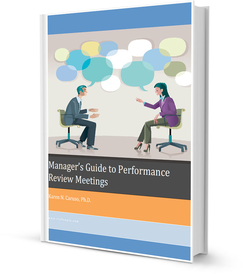Top 10 Missteps Managers Make in Performance Review Meetings
Yes, we are in the heart of performance review time. Let’s take this time to remind ourselves and the managers within our company of these 10 common performance review pitfalls.
- Missing the Opportunity. Most of our year is focused solely on driving execution – interspersed (hopefully) with some timely feedback on specific accomplishments and ongoing needs. When it comes to the end of the year performance review however, managers must set aside a formal meeting time and make the discussion a priority. While not having the meeting at all is certainly the most egregious error, constantly rescheduling and/or trying to conduct the conversation amidst other work (e.g. on the way to the client or conference, etc.) miss the mark as well. Your employee’s first clue to gauge how much you value this conversation is in the setup.
- Offering Vague Feedback. Highlighting top strengths and development needs should be the strategy for providing your employee with key takeaways from the performance review. However, failing to drill down into the specific examples of performance that clarify and provide evidence for these messages will leave your employee feeling a bit lost. Similarly, using vague or cliché language (e.g. it is what it is) can leave too much room for interpretation and diminish the specific feedback you are communicating.
- Missing Feedback From Others. Managers have direct oversight of employee performance and many opportunities to observe behavior and results over time. In today’s increasingly flat and hyper-networked organizations however, there are likely many other working relationships and exchanges that managers do not observe. Tap into this critical feedback by soliciting thoughts on employee’s performance from these various sources. This 360 or multi-rater feedback may already be a part of your formal evaluation process. If so, managers should take the time to integrate the performance feedback and examples from the many constituents to provide employees with a more comprehensive performance review.
- Neglecting to Share Critical Feedback. While Managers may intellectually know that they should provide balanced feedback, the development side is often touched on lightly and sometimes not at all. Providing critical feedback is the hard part of the conversation, however ignoring/downplaying issues can cause unpleasant surprises later on. While adequate time should be spent highlighting accomplishments and strengths, developmental feedback is just as important to your employee as it is to you. Remember to communicate improvement areas in a constructive manner that emphasizes how performance can be handled differently in the future.
- Forgetting to Recognize Accomplishments. On the flip slide, managers can sometimes go overboard with problem or new employees who need a lot of hand holding. While the performance review meeting should be forward focused and improvement oriented, it is also the time to celebrate successes together. Build engagement through discussion of the employee’s contributions to departmental and organizational goals and highlight how employee strengths can be further leveraged going forward.
- Focusing on Recent Events. Focusing on recent events is a well-known cognitive bias for all of us. To counteract this natural tendency, managers need to prepare for performance review discussions throughout the year. Leveraging technology, whether as simple as jotting down notes in your iPhone app, or as robust as an always-on performance planning system should jog your memory.
- Dominating the Conversation. While managers have the responsibility of delivering the performance review, some are so caught up in communicating the review feedback that they forget to engage employees in dialogue. The performance review meeting should be a two-way discussion, allowing employees to be heard and giving managers the opportunity to understand employee perspectives.
- Dwelling on the Past. While the performance review is a summary of past performance, adequate time should be spent linking the employee’s performance to the future. Using a forward thinking approach, managers can help employees understand “what’s done is done” and shift the focus instead to lessons learned for the future.
- Short Term vs. Long Term. While concrete planning requires us to be thinking in the here and now, managers who fail to discuss longer term career plans with employees during the review discussion miss the chance to link performance goals to bigger picture career growth. Managers should take the time to better understand how employees are progressing on long term and career goals and use the review discussion to show commitment to personal growth/development.
- Not Planning to Reconnect and Check-in. Follow up plans and action items that come out of the performance review discussion should all have general check-in and follow up dates attached. Without this level of planning and accountability, performance goals agreed upon during the meeting can get lost in the shuffle.
Let's all work together to avoid these mistakes! Click here to download The Essential Manager's Guide to Performance Review Meetings.
Share this
You May Also Like
These Related Stories
Benefits of the 90 Day Performance Review


Benefits of the 90 Day Performance Review
March 5, 2014
3
min read
Three Reasons Why Managers Avoid Performance Reviews


Three Reasons Why Managers Avoid Performance Reviews
August 18, 2015
3
min read
5 Tips for Meaningful Mid-Year Performance Reviews


5 Tips for Meaningful Mid-Year Performance Reviews
June 5, 2012
2
min read

